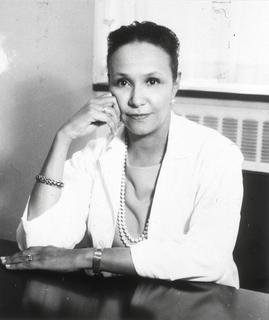One of the most important aspects of Black History Month for me has always been learning about the achievements of African Americans who are seldom mentioned in history books or the media.
This month, we are proud to highlight the many achievements of Dr. Jane Cooke Wright who was a surgeon and pioneering cancer researcher.
Dr. Wright is known for her contributions to chemotherapy. She is credited with developing the technique of using human tissue culture instead of laboratory mice to test the effects of potential drugs on cancer cells. Wright also pioneered the use of the drug, methotrexate to treat breast cancer and skin cancer.
Jane Cooke Wright was born in 1919 in New York City. Her paternal grandfather, Dr. Ceah Ketcham Wright was born into slavery. After being emancipated, he graduated medical school. Dr. Wright died when his son, Louis was four years old.
Louis’ stepfather was William Fletcher Penn, the first African American to graduate from Yale Medical School.
Jane’s uncle, Dr. Harold Dadford West, became the president of Meharry Medical College, a private historically black medical school in Nashville, Tennessee.
Jane’s father, Louis, was one of the first African Americans to graduate from Harvard Medical School. He became the first African American doctor at a public hospital in New York City. During his thirty years at Harlem Hospital, Dr. Wright founded and directed the Harlem Hospital Cancer Research Center.
Jane excelled in sports and academics during high school and received a scholarship to Smith College. After graduating with an art degree in 1942, she received a scholarship to attend the New York Medical College. She graduated at the top of her class in 1945 after completing an accelerated three-year program.
She completed residencies at Bellevue Hospital and Harlem Hospital and joined her father in research at the Harlem Hospital Cancer Research Center in 1949. She and her father became interested in chemotherapeutic agents. They wanted to make chemotherapy more accessible for everyone. During the 1940s, chemotherapy was still considered an experimental drug, and it was only used as a drug of last resort. The drugs and their dosages were not well defined.
Dr. Wright and her father believed chemotherapy should play a greater role in cancer treatment and advocated it’s use as a “front-line” drug in the battle against cancer.
They were among the first researchers to report the use of nitrogen mustard agents and folic acid antagonists as cancer treatments to stop mitosis from happening in cancer cells. The folic acid antagonists proved to be highly effective against a vast array of solid cancers including breast cancer, Hodgkin’s disease, melanoma, lymphosarcoma, prostate cancer, and several forms of leukemia.
Methotrexate, which formed the basis for all modern chemotherapy, is still used today to treat a variety of cancers.
She succeeded her father as director of the Harlem Hospital Cancer Research Center after his death in 1952.
Dr Wright’s work was the steppingstone for combination therapy and individual adjustment made to dosages based on patient toxicity. In combination therapies, a chemotherapy drug which attacks cells as they divide is paired with a chemotherapy drug that attacks cells at rest. Monoclonal antibodies may also be used to target certain types of cancers.
In 1955, she accepted a research appointment at the New York University Bellevue Medical Center, as Associate Professor of Surgical Research and Director of Cancer Research. In addition to her research, Dr. Wright actively treated patients.
In 1964, she was the only woman among seven physicians who helped found the American Society of Clinical Oncology. In 1971, she became the first woman elected president of the New York Cancer Society.
In 1966, she was appointed to the National Cancer Advisory Board (Council) by President Johnson. She served from 1966-1970. He also appointed her to the President’s Commission on Heart Disease, Cancer, and Stroke (1964-1965). Dr. Wright led international delegations of oncologists to China, the Soviet Union, Europe, and Africa.
In 1947, Dr Wright married David D. Jones, an attorney, who became founder of the anti-poverty and job training organizations for young African Americans. They had two daughters who grew up to work in the medical field, one as a psychiatrist and the other as a clinical psychologist.
Dr. Wright retired in 1987. She stayed active enjoying sailing, painting with watercolors, and reading mystery novels. She died at the age of 93. Her work saved millions of lives including my own.
Thank you Dr. Wright!






